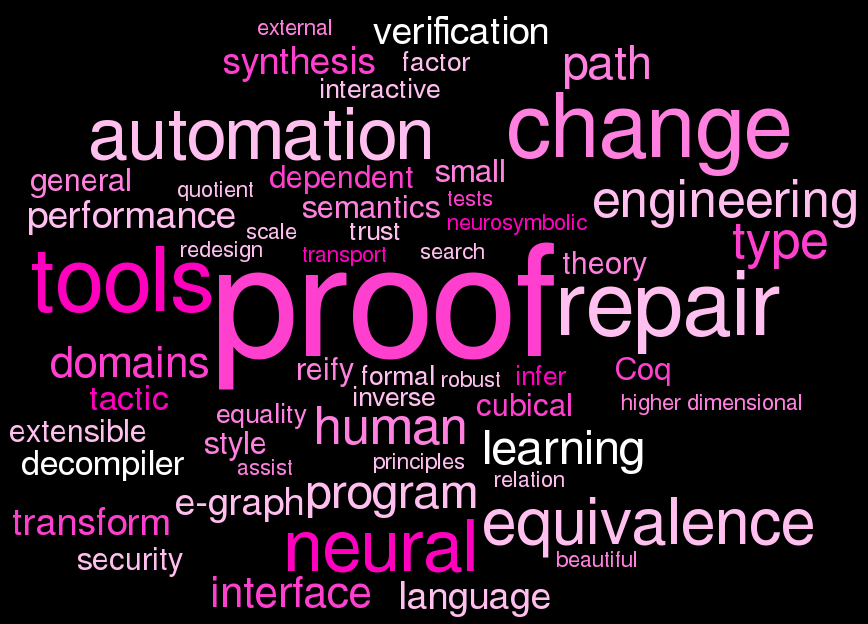Asterisks next to names indicate shared first, last, or corresponding authorship.
Jilin Hu, Jianyu Zhang, Yongwang Zhao*, and Talia Ringer*. HybridProver: Augmenting Theorem Proving with LLM-Driven Proof Synthesis and Refinement. Under Submission.
Talia Ringer. Mathematicians put AI model AlphaProof to the test (News & Views). Nature (Nov 2025).
Saketh Ram Kasibatla, Arpan Agarwal, Yuriy Brun, Sorin Lerner, Talia Ringer, and Emily First. Cobblestone: Iterative Automation for Formal Verification. ICSE 2026.
Cosmo Viola, Max Fan, and Talia Ringer. Proof Repair across Quotient Type Equivalences. OOPSLA 2025.
Borhane Blili-Hamelin, Christopher Graziul, Leif Hancox-Li, Hananel Hazan, El-Mahdi El-Mhamdi, Avijit Ghosh, Katherine Heller, Jacob Metcalf, Fabricio Murai, Eryk Salvaggio, Andrew Smart, Todd Snider, Mariame Tighanimine, Talia Ringer*, Margaret Mitchell*, and Shiri Dori-Hacohen*. Stop Treating ‘AGI’ as the North-Star Goal of AI Research. ICML 2025 (Position Track).
Alex Sanchez-Stern, Abhishek Varghese, Zhanna Kaufman, Dylan Zhang, Talia Ringer, and Yuriy Brun.
QEDCartographer: Automating Formal Verification Using Reward-Free Reinforcement Learning.
ICSE 2025.
Talia Ringer. Proofs and Conversations (Early Career). Notices of the American Mathematical Society 71, 9 (Oct 2024).
Audrey Seo*, Chris Lam*, Dan Grossman, and Talia Ringer. Correctly Compiling Proofs About Programs Without Proving Compilers Correct. ITP 2024.
Dylan Zhang, Curt Tigges, Zory Zhang, Stella Biderman, Maxim Raginsky, and Talia Ringer. Transformer-Based Models Are Not Yet Perfect At Learning to Emulate Structural Recursion. TMLR 2024. (2023 short whitepaper version here.)
Tom Reichel and Talia Ringer.
ProofDB: A Prototype Natural Language Coq Search Engine.
AITP 2024.
Dylan Zhang, Emily First, and Talia Ringer. Getting More out of Large Language Models for Proofs. AITP 2023.
Emily First, Markus Rabe, Talia Ringer, and Yuriy Brun. Baldur: Whole-Proof Generation and Repair with Large Language Models. ESEC/FSE 2023. Distinguished Paper Award.
Tom Reichel, R. Wesley Henderson, Andrew Touchet, Andrew Gardner*, and Talia Ringer*. Proof Repair Infrastructure for Supervised Models: Building a Large Proof Repair Dataset. ITP 2023.
Alex Sanchez-Stern*, Emily First*, Timothy Zhou, Zhanna Kaufman, Yuriy Brun, and Talia Ringer. Passport: Improving Automated Formal Verification Using Identifiers. TOPLAS Volume 45, Issue 2: No. 12, pp 1-30. Presented at PLDI 2023. Tool repository.
Arpan Agrawal, Emily First, Zhanna Kaufman, Tom Reichel, Shizhuo Zhang, Timothy Zhou, Alex Sanchez-Stern, Talia Ringer, and Yuriy Brun. Proofster: Automated Formal Verification. ICSE 2023 (Demo Track). Demo video, tool website.
Hannah Leung, Talia Ringer, and Chris Fletcher. Towards Formally Verified Path ORAM in Coq. CoqPL 2023.
Emily Ruppel*, Sihang Liu*, Elba Garza, Sukyoung Ryu, Alexandra Silva, and Talia Ringer. Long-Term Mentoring for Computer Science Researchers. Communications of the ACM (CACM): Volume 66: No. 5, pp 33-35. May 2023.
Seth Poulsen, Matthew West, and Talia Ringer. Autogenerating Natural Language Proofs for Proof Education. The Coq Workshop 2022.
Talia Ringer. Proof Repair. Ph.D. Thesis, University of Washington, 2021. Defense video.
Talia Ringer, RanDair Porter, Nathaniel Yazdani, John Leo, and Dan Grossman. Proof Repair across Type Equivalences. PLDI 2021. Talk video.
Talia Ringer, Alex Sanchez-Stern, Dan Grossman, and Sorin Lerner.
REPLICA: REPL Instrumentation for Coq Analysis. CPP 2020. Talk video.
Talia Ringer, Karl Palmskog, Ilya Sergey, Milos Gligoric and Zachary Tatlock. QED at Large: A Survey of Engineering of Formally Verified Software, Foundations and Trends® in Programming Languages: Vol. 5: No. 2-3, pp 102-281. 2019. Errata, Q & A.
Talia Ringer, Nathaniel Yazdani, John Leo, and Dan Grossman. Ornaments for Proof Reuse in Coq. ITP 2019. Talk Video.
Talia Ringer, Nathaniel Yazdani, John Leo, and Dan Grossman.
Adapting Proof Automation to Adapt Proofs. CPP 2018. Talk video.
Talia Ringer, Dan Grossman, Daniel Schwartz-Narbonne, and Serdar Tasiran. A Solver-Aided Language for Test Input Generation. OOPSLA 2017. Talk video.
Talia Ringer, Dan Grossman, and Franziska Roesner. AUDACIOUS: User-Driven Access Control with
Unmodified Operating Systems. CCS 2016. Talk video.





